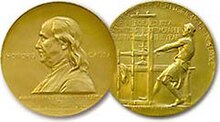Ira Berkow
Ira Berkow (born January 7, 1940, in Chicago, Illinois) is an American Pulitzer Prize winning sports reporter, columnist and writer.
Life

Berkow earned his BA in English Literature at Miami University, and his MA from the Medill School of Journalism, Northwestern University.[1] [2]
He was a reporter for the Minneapolis Tribune, a syndicated features writer and sports editor for the Newspaper Enterprise Association.[3]
From 1981 to 2007 he was a sports reporter and columnist for The New York Times[4] [5] and has written for Esquire, The New York Times Magazine, Art News, Seventeen, Chicago Magazine, The Chicago Tribune Magazine, National Strategic Forum Review, Readers' Digest and Sports Illustrated, among others.[6]
He shared the 2001 Pulitzer Prize for National Reporting for his article "The Minority Quarterback"[7] in The New York Times series How Race Is Lived in America. [8] [9]
He was also a finalist for the Pulitzer Prize in 1988, "For thoughtful commentary on the sports scene."[10]
In 2006, he was inducted into the International Jewish Sports Hall of Fame.[11]
Berkow wrote the script for the documentary film Jews and Baseball: An American Love Story (2010) and is the author of 18 books including the Edgar Allan Poe Award nominated non-fiction The Man Who Robbed The Pierre: The Story of Bobby Comfort and the Biggest Hotel Robbery Ever. [12]
Works
Books
- Hank Greenberg: The Story of My Life, Times Books, 1989, ISBN 978-0-8129-1741-3
- Red: A Biography of Red Smith, Rockin Steady, University of Nebraska Press, 2007, ISBN 978-0-8032-6040-5
- Court Vision, To The Hoop: The Seasons of a Basketball Life, University of Nebraska Press, 2004, ISBN 978-0-8032-6229-4
- The Gospel According to Casey, St. Martin's Press, 1992, ISBN 978-0-312-06922-3
- The Minority Quarterback & Other Lives In Sports, I.R. Dee, 2002, ISBN 978-1-56663-422-9
- Full Swing; Hits, Runs and Errors in a Writer’s Life, Ivan R. Dee Publisher, 2007, ISBN 978-1-56663-755-8
- Maxwell Street, Survival in a Bazaar. Doubleday & Co., 1977, ISBN 0-385-06723-2.
Film
- Jews and Baseball: An American Love Story, 2010 documentary film; writer
References
- ^ "Ira Berkow". Medill School Northwestern University. Retrieved June 5, 2011.
- ^ "Ira Berkow Papers at the American Jewish Historical Society". American Jewish Historical Society. Retrieved July 22, 2015.
- ^ "Sportswriter Ira Berkow Reminiscence". Evesmag.com. Retrieved December 22, 2010.
- ^ "Ira Berkow". Retrieved June 5, 2011.
- ^ "Sportswriter Ira Berkow Reminiscence". Evesmag.com. Retrieved December 22, 2010.
- ^ "Ira Berkow". Retrieved June 5, 2011.
- ^ Ira Berkow (July 2, 2000). "The Minority Quarterback". The New York Times. Retrieved June 5, 2011.
- ^ "Ira Berkow". Jewishsports.net. January 7, 1940. Retrieved December 22, 2010.
- ^ "Pulitzer Series". Nl.edu. Retrieved December 22, 2010.
- ^ "The Pulitzer Prizes | Finalists". Pulitzer.org. February 20, 1988. Retrieved December 22, 2010.
- ^ International Jewish Sports Hall of Fame (2010). "Ira Berkow". Retrieved December 22, 2010.
- ^ "Edgar Award Winners and Nominees". Mystery Writers of America. Retrieved June 5, 2011.
Further reading
Ruttman, Larry (2013). "Ira Berkow: New York Times Journalist, Author, Pulitzer Prize Winner, and Jewish Son". American Jews and America's Game: Voices of a Growing Legacy in Baseball. Lincoln, Nebraska and London, England: University of Nebraska Press. pp. 147–156. ISBN 978-0-8032-6475-5. This chapter in Ruttman's history, based on a June 28, 2008 interview with Berkow conducted for the book, discusses Berkow's American, Jewish, baseball, and life experiences from youth to the present.
External links
- "Ira Berkow", Charlie Rose
- Ira Berkow Papers at the American Jewish Historical Society, New York, NY and Boston, MA
